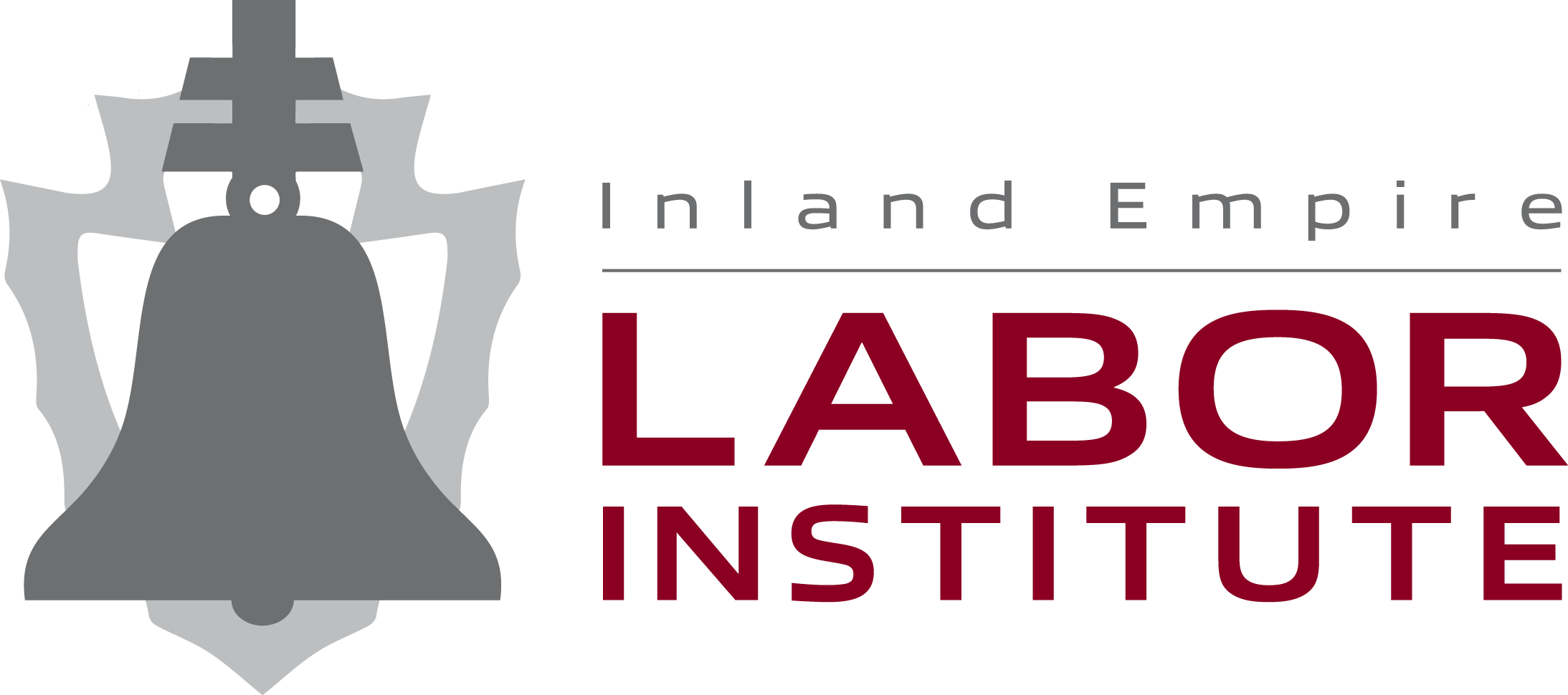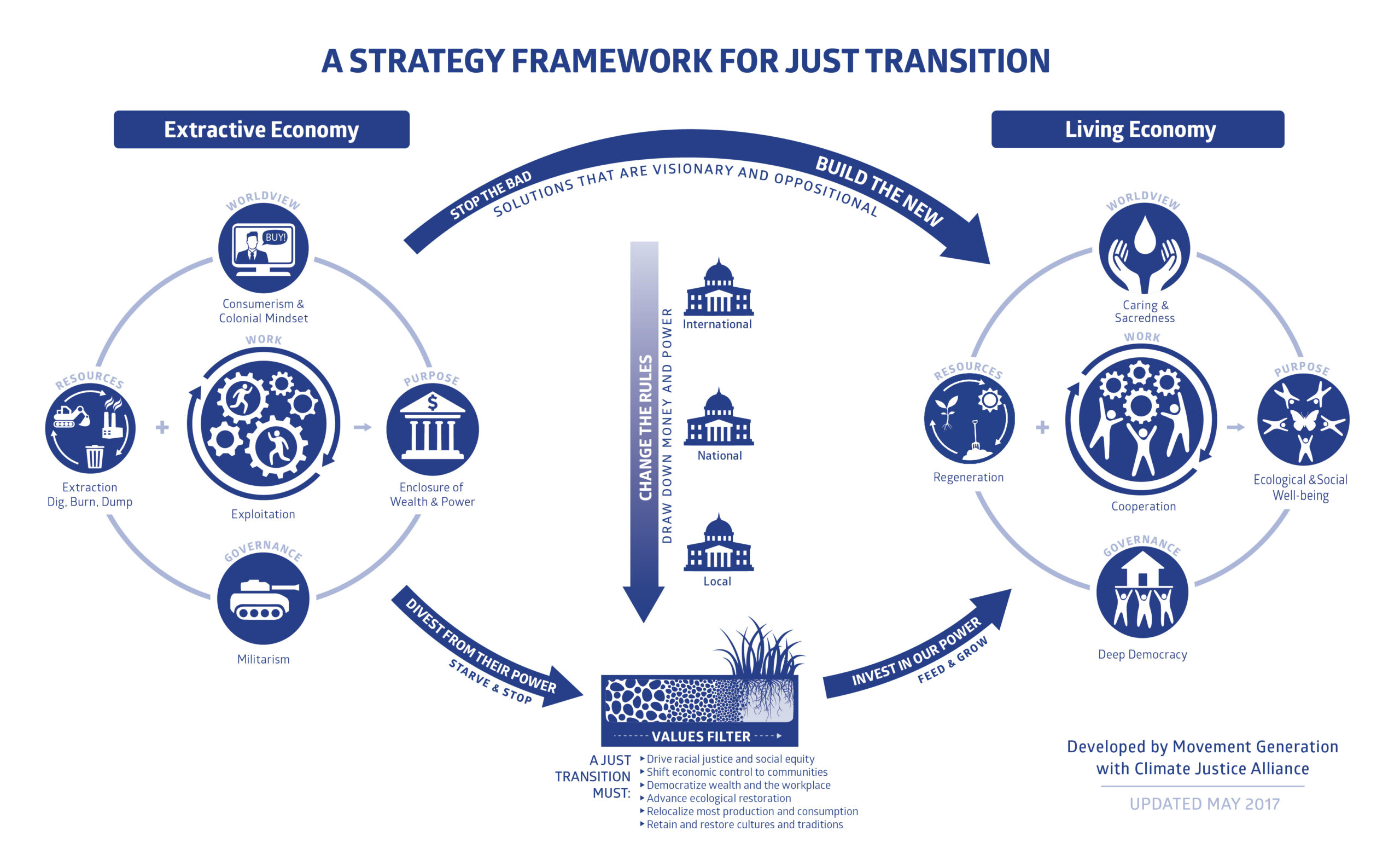By Jacob Jakubowski
On September 24, 2024, the Inland Empire Labor Institute organized a roundtable on the concept of Just Transition with representatives of unions, community-based organizations, local governments, and educational institutions as part of its 2024 Quality Green Jobs initiative. The roundtable featured presentations by Celina Barron, a journey level worker from the International Brotherhood of Electrical Workers Local 11; Dave Campbell, the Secretary Treasurer of United Steelworkers Local 675; and Eddie Torres, a Policy Director at Inland Coalition for Immigrant Justice. They discussed the promise of not just jobs that are renewable and “green” in nature, but a “Just Transition” that will lead to climate justice and high-paying jobs, with unions at the forefront.
But what is “Climate Justice” or a “Just Transition?” According to the Quality Green Jobs roundtable meeting, climate justice represents enacting a regenerative economy that puts communities at the forefront of development without exploiting the environment, slowly but surely creating a future without the need for fossil fuels and moving away from our current unsustainable extractive economy. Meanwhile, “Just Transition” is the realistic ability to transition into this type of regenerative economy without sacrificing those who are already ingrained in the system, and a refusal to exploit immigrant labor.
Information from the Just Transition Alliance was presented to give a clear definition during the meeting: “Just Transition is a principle, a process, and a practice. The principle of just transition is that a healthy economy and a clean environment can and should coexist. The process for achieving this vision should be a fair one that should not cost workers or community residents their health, environment, jobs, or economic assets. Any losses should be fairly compensated. And the practice of just transition means that the people who are most affected by pollution, the frontline workers and the fence line communities, should be in the leadership of crafting policy solutions.”
Celina Barron is a prominent advocate for women in the trades as a co-founder of the Tradeswoman Ran Association for Diversity and Equity, also known as T.R.A.D.E. Her presentation during the meeting highlighted her many years of experience in the construction industry, and how centering the community is the most important part of a “Just Transition” and why exactly unions are the way to do it. She focused on the relationship between labor and climate, how organized labor can help unorganized workers. She called for unions to stop current infighting with the need to “be together about being together”, and stop the “unskilled labor” rhetoric, instead calling for respect and honor for all labor.
With workers as community members at the forefront, the strategy is to ethically transition work into renewable fields by uplifting everyone, not just the few. Workers already in jobs such as refineries aren’t just to be thrown to the wolves, but to take part in the transition itself. Dave Campbell, who has been a leader in Just Transition initiatives in the labor movement for decades, described how during this transition how steelworkers who have spent their career in refineries can apply their already well-honed skills and knowledge into new and rapidly growing “green” jobs, and even having a realistic outlook, offering pensions and aid while transitioning into a regenerative economy.
During the meeting, it was expressed how important community leadership for the future was, with unions literally at the table discussing their own history with Just Transition, their work, and how it will be affected by climate change and the inevitable shift towards renewable energy. Dave Campbell said, “… we all tend to think the world is the way it is, and it’s gonna stay that way forever. Well, here’s a picture of the transition from horses and carriages, to cars. And we’re to the point we’re going to be saying goodbye to internal combustion engines”. It seems those with the most experience working in our current extractive economy understand the inevitable change that has to happen. The “Just Transition” model seeks to right the wrongs of past economic endeavors we have seen, letting no one be left behind, and seeing communities and labor as the lifeblood of this regenerative economy.
Eddie Torres, an experienced immigrant policy advocate, spoke about the need to incorporate immigrant justice into the framework of a Just Transition. As part of the Inland Coalition for Immigrant Justice, he has supported Shut Down Adelanto, a coalition of over twenty immigrant advocacy organizations. Their goals are quite on the nose, as their work began with and continues to revolve around shutting down Adelanto ICE Processing Center, which only holds 3 men currently and has received multiple lawsuits due to civil violations.
To address the economic role of the ICE Processing Center for Adelanto, Eddie Torres suggests a “Just Closure,” which according to him is a “phase-out process that ensures immigrants are completely liberated and allowed to be reunited with their communities and have support beyond release from incarceration, and that elected leaders reinvest in localities that have been preyed on by carceral profiteers that force under-resourced communities to rely on immoral prison pipelines. [A ‘Just Closure’] empowers locals to reimagine public safety, health, and their community’s wellness.”
Eddie Torres further cited the very real intersection of environmental justice and immigration through the case of poor water quality in the Adelanto area, a situation that immigrant residents and detainees both live with thanks to the legacy of George Air Force Base. He then described the HEAL program, which stands for Healthy Economies Adapting for Longevity and is based on the “Just Closure” vision. HEAL includes financial support, jobs, and real roads to recovery for those previously detained by the complex industrial prison system. The California Workforce Development Board will release funding for HEAL initiatives around the state in 2025.
With the community itself at the helm, Just Transition is becoming more than a principle. It will become a process we embrace, and a practice we carefully navigate. Rather than try to prevent change to the status quo, Just Transition offers a prosperous alternative with unions, high-paying jobs, immigrant justice, a thriving regenerative economy, and a clean environment for us all to enjoy.
Jacob Jakubowski is an intern at the Inland Empire Labor Institute for 2024-25 through Riverside City College’s Community Action Leadership Academy.

